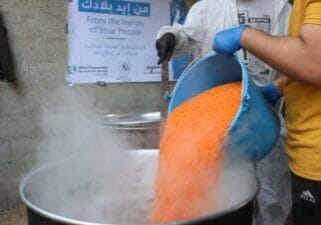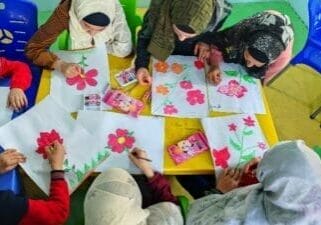News > Blog
‘Survival, Resilience and Solidarity’: Our Relief Efforts in Gaza
Published 02/11/2024 by Global Communities

By Maureen Simpson
Now over four months in, the humanitarian crisis in Gaza has reached catastrophic levels, with one in four households facing famine levels of food insecurity and severely limited access to safe water.
“Our mornings begin with a silent check – are the kids, is everyone, alright?” said Mohammad, one of 74 staff members from Global Communities who is still on the ground in Gaza and the West Bank. “Our needs have undergone a profound transformation. The priorities of our past seem distant now; our focus is singular – survival.”
Of the more than 1.7 million people who have been internally displaced by the war between Israel and Hamas, many are staying at overcrowded shelters or on the streets. The United Nations warns that hunger and starvation, dehydration and illness will continue to increase as significant damage has been inflicted upon critical infrastructure and essential health and sanitation services.

FOOD ASSISTANCE
Global Communities is currently responding as one of the World Food Programme’s main implementation partners. In the first weeks following the escalations, we provided food vouchers that assisted 100,000 individuals. However, voucher redemption rates significantly dropped as markets collapsed. Consequently, Global Communities worked closely with WFP to pivot to in-kind food distributions, supporting affected households living outside United Nations Relief and Works Agency (UNRWA) centers.
“In Gaza, amid daily fear, pain and uncertainty, our team has been delivering lifesaving support in their communities, often walking or riding bikes for hours to reach distributions at the warehouse, despite significant security threats,” said Kelly Van Husen, Vice President, Humanitarian Assistance at Global Communities. “Each food parcel distributed, every task completed and every act of humanity extended is a testament to our collective commitment to care for those in need.”
To date, Global Communities has distributed 154,698 food parcels, serving over 700,000 affected individuals. Each parcel provides two weeks of support for a family of five.
Through other private funds and in-kind support from the World Central Kitchen, Global Communities — alongside local partner WEFAQ Association for Women and Childcare (WEFAQ) — was able to support 2,563 families with hot meals during the last week of December. Each family received two rounds of hot meals, each supporting three to six family members.
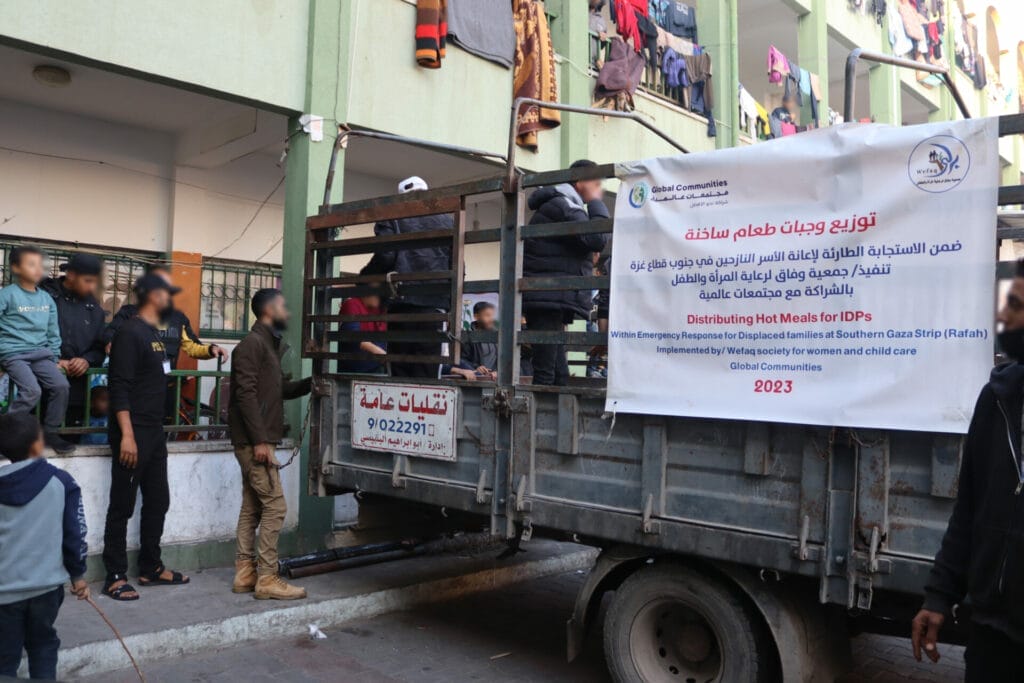

WINTERIZATION SUPPORT
People whose lives have been upended by the war between Israel and Hamas must now cope with the onset of winter. Through funds provided by the Bank of Palestine, we provided winterization vouchers to 1,000 households in early December, enabling families to purchase much-needed clothing to get through the colder months ahead. An additional 3,000 people received winterization materials and hygiene products to help insulate their tents and other temporary shelters and take care of their basic needs.
“Most Palestinians currently displaced in Gaza left their homes with very little, expecting to be able to return shortly. They left in October when the weather was still warm. Temperatures have now dropped and we’ve had several instances of flooding,” said Elise Hannaford, Senior Manager, Humanitarian Response at Global Communities. “The vouchers we provided in December enabled them to buy coats and other vital items to withstand the harsh conditions.”

HYGIENE & PROTECTION KITS
The majority of the Gazan population is now living in a small part of Gaza that was not designed to accommodate the number of people currently living there. Collective centers have four or five times the population they were designed to accommodate, and others are living on the streets or in informal settlements.
“We are facing unprecedented inhumane life conditions at all levels,” said Yazdan, another staff member in Gaza who is staying in a shelter with 10 family members. “Most of the time we have no running water, and it’s too dark to check your steps while passing through the crowd of sleeping people in the school corridors. … We have minimal food, water and definitely almost no medical care.”
High levels of overcrowding, coupled with subpar medical support and access to basic hygiene items, can cause rapid spread of waterborne diseases and skin infections, among other issues.
“We’ve seen drastic increases over the last few months of preventable disease,” Hannaford said. “Hygiene items are a small step in helping prevent further spread, but it’s not enough. Access to water and medical support are also an integral part, and aid distribution is still severely hampered.”
Despite these challenges, Global Communities — in collaboration with WEFAQ — successfully distributed hygiene and protection kits last month. This initiative supported 5,500 individuals, including Global Communities staff and those of local implementing partners, as well as the families they host. Each kit included essential items such as soap, toothpaste, toothbrushes, combs, diapers and baby formula. A few toys were included as comfort items for children as well.
“What is giving me hope is that we are still alive, and my family is around me. They are all sticking together to fight through and cope with this pain and harsh reality,” Yazdan said. “I live for family and [for] watching my niece and nephew grow at the shelter. I won’t give up to give them a better life and overcome their fears and anxiety.”
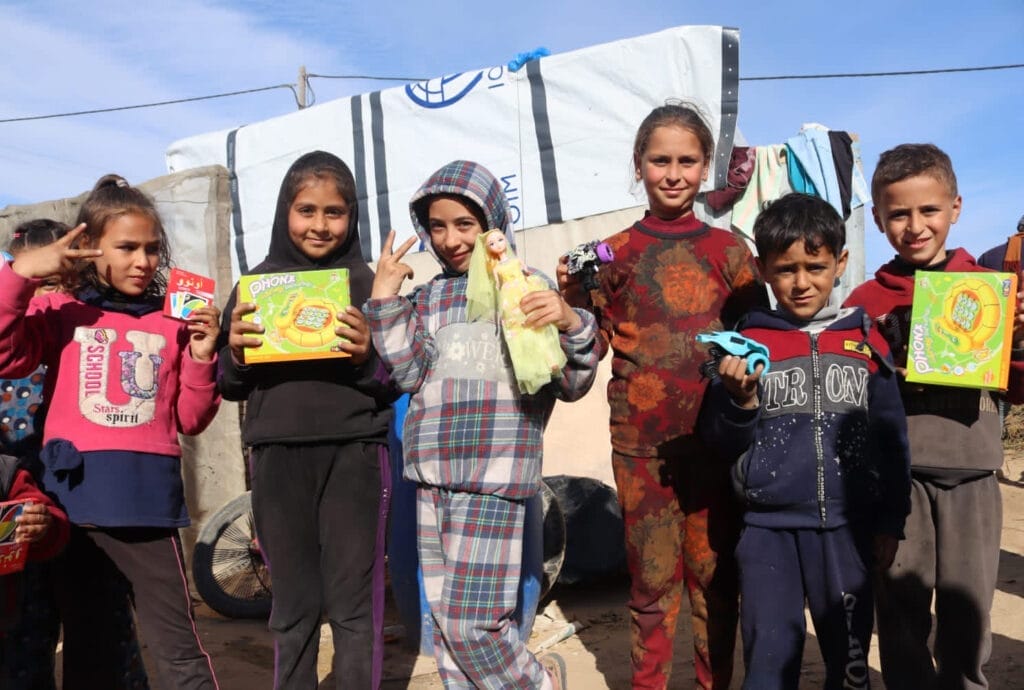

DISTRIBUTION NETWORK
Before the escalation of hostilities in October 2023, humanitarian food assistance was supporting over two-thirds of the population in Gaza. Now, the amount of available aid does not adequately cover the rapidly growing life-threatening needs.
The latest data from IPC shows that virtually all households are skipping meals every day, and many adults go hungry so children can eat. Additionally, UNOCHA says that before the crisis, about 500 truckloads of approved humanitarian goods, including fuel, were delivered each working day in 2023. As recently as the first week of February 2024, less than half that number has been allowed in.
… We wish the world understood our reality. Our lives go beyond conflict statistics; they are about survival, resilience and solidarity. Every day, we focus on the essentials: safety, family and mutual support.”
Mohammad, Global Communities staff member in Gaza
To maximize both the reach and impact of our support, Global Communities is actively coordinating with other nongovernmental organizations (NGOs) through the Logistics Cluster, other humanitarian coordination structures, and bilaterally in Gaza, the West Bank and Egypt. We have also developed strong partnerships with civil society organizations, local nonprofits and the private sector.
With a large distribution network throughout Central and Southern Gaza, we have the ability to support other organizations with their response efforts. To date, this has included distributing non-food items such as water and hygiene products alongside food parcels.
“I feel moved to go from being an internally displaced person in need to the one who can offer help and services. I have to utilize my talents and capacities for the good of people,” Yazdan said. “It’s time to get all efforts to support not the thousands but millions of people in need.”

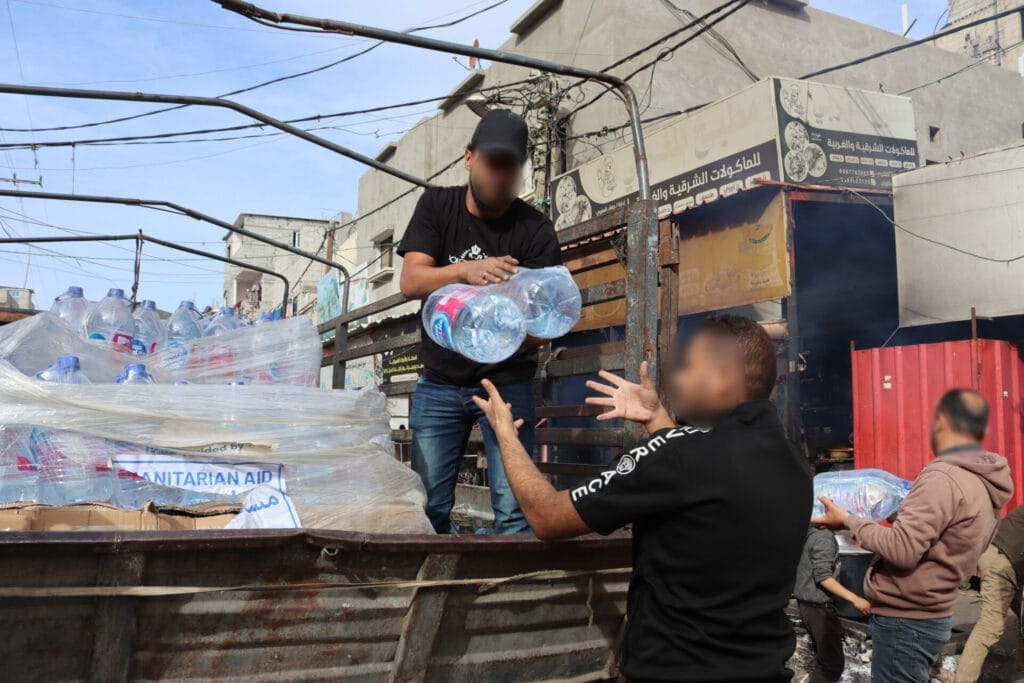
CONTINUED APPROACH & ENGAGEMENT
Global Communities will continue to leverage our operational capacity in Gaza and close relationship with local communities to:
- Distribute essential food and non-food items, including ready-to-eat rations, winterization items and hygiene kits;
- Provide a larger distribution network to ensure essential items are distributed quickly;
- Deliver shelter support, including emergency shelter assistance, emergency housing repairs and support to host families/rental assistance;
- Provide water, sanitation and hygiene (WASH) support, including ensuring access to clean water, small repairs to WASH systems, emergency sanitation facilities and access to cleaning and hygiene items; and
- Provide psychosocial support and other protection services.
By working through our network of partners as much as possible and supplementing those relationships with direct support as needed, we aim to fill gaps in current response efforts, focusing on areas and people not yet receiving support. This includes households outside of UNRWA shelters and those living in unofficial collective centers, informal settlements or with host families.
“Our work, now more than ever, is a lifeline,” Mohammad said. “It’s not just a job. It’s our commitment to providing the bare essentials that sustain life in these trying times.”
George Kapataies contributed reporting to this story, for which an Arabic translation is available and linked here.



